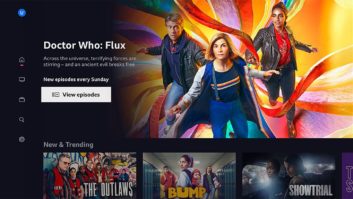The BBC has revealed that viewers are eight times more likely to stream programmes from its new iPlayer seven-day broadband catch-up service than to download them for later viewing. The Windows Media-based P2P downloads offer better quality video, but the Flash-based streams offer instant gratification, writes David Fox.
The service averaged about 250,000 downloads or streams per day in the fortnight between Christmas Day (when the BBC started its “making the unmissable, unmissable” marketing) and 7 January, with more than one million users accessing more than 3.5 million programmes over that period. Its most successful day recently, January 13, saw more than 250,000 users access some 380,000 programmes. The Corporation had hoped for 500,000 users by now, so the service (using technology provided by Red Bee Media) has been far more successful than expected. iPlayer was launched as a beta test last July and had been updated mid-December to allow streaming (and therefore Mac compatibility).
“Typically, people who use the BBC iPlayer are spending nearly half an hour a day watching streams of their favourite programmes, suggesting that it looks set to revolutionise the way BBC Television programmes are viewed in the UK,” commented Ashley Highfield, the BBC’s director of future media and technology.
The ten most popular programmes, including Doctor Who, Extras and Top Gear, accounted for about 25% of all programmes viewed, but nearly half the shows viewed were outside the 50 most popular in the TV ratings, which Highfield said “demonstrates how on demand services can bring niche programming to a wider audience”. The BBC puts about 250 programmes per week on the service.
Highfield believes that downloads will become more appealing once it has “implemented bookmarking (pre-ordering of programmes to be downloaded, possibly ahead of transmission so that they are available in your ‘download manager’ immediately after the programme has aired) and ‘series stacking’ (downloading the first few episodes of a drama and binging on them to catch up with the story).”
The iPlayer could also be made available through the newly revamped AppleTV. In his blog, Highfield said that Apple’s move to a rental model (which it has announced for movies), “means that we can look to getting BBC iPlayer onto this platform too, as we should be able to use the rental functionality to allow our programmes to be downloaded, free, but retained for a time window, and then erased, as our rightsholders currently insist.” Apple’s rental software also allows viewing of material on any Windows PC or Mac via iTunes, or downloading to iPods or iPhones (while maintaining rights restrictions).
He hopes to make it simpler to get iPlayer content on to people’s TV sets, wanting “a solution that my mum can install,” and AppleTV and making iPlayer available on the Virgin cable platform later this Spring would be important steps in that regard. He is also looking forward to the introduction of IP-enabled TV sets (as shown by Panasonic and others at CES this month) and the move to open hybrid DTT/IP set-top boxes.







